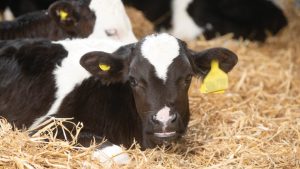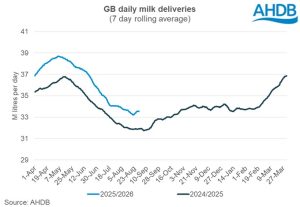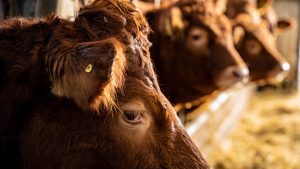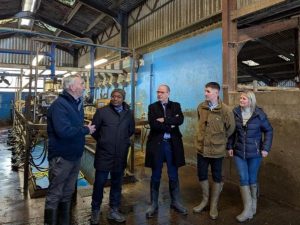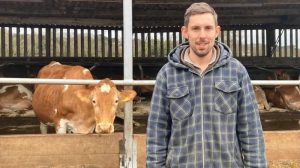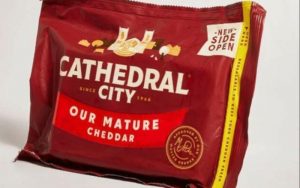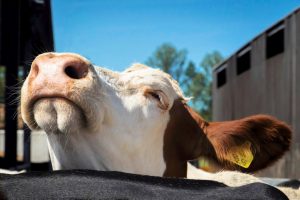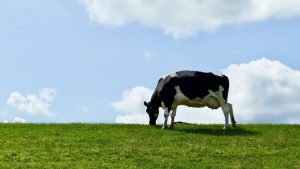
Their primary residence is in Houston, Texas, where Dennis works in the oil and gas industry. Annie, their daughter, raises grass-fed lamb with her husband on her parents’ 140-acre parcel in Addison County, a swath of open pasture, furrowed by streams and wooded gullies, that slopes down toward Arnold Bay in Lake Champlain.
The Hoppers’ neighbors, the Dutch-born brothers Hans, Rudy and Gerard Vorsteveld, operate a dairy that consists of roughly 2,400 acres and 1,500 Holsteins. Since the brothers took over the farm from their father in 1998, they’ve almost quadrupled the size of their herd and expanded westward toward the lake from their main farmstead on Jersey Street.
In 2013, the Vorstevelds bought Arnold Bay Farm, a former dairy just up the road from the property that the Hoppers purchased one year later. The brothers now use the barn at Arnold Bay to house young cows; on the several hundred acres of surrounding land, they grow corn for feed. In contrast to the elegantly typeset sign at the end of the Hoppers’ driveway advertising Annie’s sheep operation, the Vorstevelds’ Jersey Street farmstead announces itself by way of a large cement block near the feed storage bunkers, which proclaims, in large capital letters, “EAT ME.”
For six days in mid-December and early January, the neighbors sat on opposite sides of an Addison County courtroom to resolve the question of whether the Vorstevelds should be held responsible for alleged damages to the Hopper property. In a spring 2020 lawsuit, the Hoppers claim that the underground drainage pipes in the Vorstevelds’ cornfields were spewing manure-filled runoff onto their land, eroding their streambeds, contaminating their pond with E. coli, besliming their shoreline and filling Arnold Bay with turbid brown water.
The Vorstevelds have argued that their land management practices comply with state regulations. Their expert witness, University of Vermont hydrologist and researcher Joshua Faulkner, testified that the real culprit is more likely climate change, which has increased the frequency and intensity of rainstorms, leading to more runoff and stirring up sediment in the lake.
Nor do the parties see eye to eye on how a ruling from Judge Mary Miles Teachout, expected sometime after this month, might play out beyond the courtroom. In a recent interview with Seven Days, Jim Foley, one of the Vorstevelds’ attorneys, called the case “a Pandora’s box,” the beginning of a possible avalanche of similar lawsuits against dairy farms from disgruntled neighbors. “I’d be nervous if I was a farmer,” said Foley.
“What’s being litigated here is really a civil matter.”NATURAL RESOURCES SECRETARY JULIE MOORE
Rob Woolmington, the Hoppers’ lawyer, dismissed Foley’s characterization of the stakes as fearmongering. In lieu of monetary damages, the Hoppers have asked the court to compel the Vorstevelds to fix the runoff situation by changing their farming methods; the suit, Woolmington insisted, isn’t about putting the brothers out of business.
“The idea that this somehow threatens dairy farming in Vermont is this false narrative the Vorstevelds’ lawyers are peddling,” he said. “This is a site-specific, farm-specific problem.”
But the proceedings have raised bigger questions about the effectiveness of the state’s regulation of farms, a task currently divided between the Agency of Agriculture, Food and Markets, which oversees on-the-farm activities, and the Agency of Natural Resources, which intercedes when farm discharge enters a state waterway. If the court ruled in favor of the Hoppers, it could be “a wake-up call” for regulators, Woolmington said. If the court found in favor of the Vorstevelds, the environmental community would probably go apeshit.
“If the Vorstevelds win and they turn out to be in compliance with all the right farm rules, and you still have this problem of massive amounts of sediment-laden runoff pouring over the neighbor’s property and polluting Lake Champlain, it means that our existing regulatory structure is not robust enough to protect the environment,” said Elena Mihaly, an attorney with the nonprofit Conservation Law Foundation, which advocates for environmental policy reform.
The Vorstevelds have previously tangled with regulators over their land management practices. In November 2020, ANR fined the farm $21,750 for improperly dredging and filling wetlands near Dead Creek. Last spring, the brothers reached a $30,000 settlement agreement with the Town of Ferrisburgh for clearing more than 2,000 trees in a town right-of-way.
Over the past five years, ANR has received more than two dozen complaints about Vorsteveld Family Farm, ranging from reports of a busted refrigerator graffitied with male genitalia to possible manure leakages from one of the farm’s waste storage pits. Before the Hoppers sued the Vorstevelds, they had filed several complaints with ANR about the brothers’ removal of trees and vegetation along the edge of their cornfields — which they feared would allow more runoff onto their property — and brown water flowing into the lake. None of those complaints resulted in enforcement action.
ANR has stayed out of the litigation, said Secretary Julie Moore, because the Hoppers’ grievances don’t fall under agency jurisdiction.
“There’s sort of a misunderstanding that [ANR] has a role to play in issues around drainage between adjoining property owners, and we believe that we really don’t, unless it involves the outright manipulation of a water of the state,” Moore said. “What’s being litigated here is really a civil matter, and the Hoppers are pursuing the right legal course.”
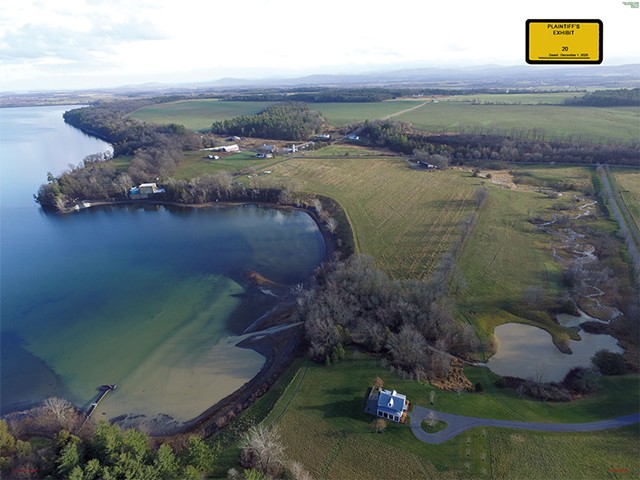
During the trial, Vicki Hopper testified about a “wall of ammonia” coming from the manure pits — an odor so noxious, she said, that on certain summer days, she and her husband had to retreat indoors and shut all the windows. Samples from their pond indicated levels of E. coli consistent with those found in “sewage before treatment,” the Hoppers’ complaint states. Their expert witness, Cornell University soil scientist Harold van Es, testified that he found the Vorstevelds’ soil and manure management techniques inadequate and that, without significant adjustments, the effects on the Hopper property would likely persist.
The Vorstevelds, for their part, have maintained that they employ best practices in land management. Faulkner, the Vorstevelds’ expert witness, testified that he wouldn’t be surprised if the health of the Hopper pond has actually improved since the Vorstevelds began farming the nearby fields, “given the adoption of soil health management practices really above and beyond what other farms are doing.” He also hypothesized that the Hoppers’ land management practices — for instance, keeping their grass mown short — have contributed to the sediment-filled runoff flowing into the lake.
“In the middle of a pandemic where our farmers are feeding us, we don’t think we need more stringent regulations or field management.”AGRICULTURE SECRETARY ANSON TEBBETTS
At various points during the trial, the Vorstevelds’ lawyers seized upon the Hoppers’ wealth to paint their lawsuit as a gambit to run the Vorstevelds out of their pastoral idyll. Over objections from Woolmington, Foley pressed Vicki Hopper for details about her husband’s unsuccessful bids to buy Arnold Bay Farm from the Vorstevelds — first for $2 million, then for $4 million. Foley also suggested that the Hoppers had donated more than $70,000 to the Conservation Law Foundation to encourage the nonprofit to pursue legal action against the Vorstevelds. (Vicki replied that the donations were a thank-you for “the testing of water in culverts” in 2017.)
The Conservation Law Foundation has, in fact, sought harsher sanctions for the farm in matters not directly related to the Hopper case. Last year, its attorneys asked the courts to consider a steeper penalty than the $21,750 fine that ANR issued the Vorstevelds for the Dead Creek wetlands violations. In December, a judge rejected the foundation’s argument that the fine was insufficient to prevent future transgressions.
“Both the Hopper case and the penalty are emblematic of an overall failure in the way that we’re controlling farming practices as they relate to water quality and the way that we’re enforcing the law against farmers,” said Mihaly, the Conservation Law Foundation attorney.
The impacts of the climate crisis, she said, will only heighten the need for more robust regulation. In December, the Conservation Law Foundation, along with two other environmental groups, urged Agriculture Secretary Anson Tebbetts to update the state’s required agricultural practices — a body of rules, last revised in 2018, intended to keep manure and other contaminants out of the state’s waterways.
Tebbetts maintains that the current protocols were developed with the climate crisis in mind.
“In the middle of a pandemic where our farmers are feeding us, we don’t think we need more stringent regulations or field management, because it’s all in there,” he told Seven Days. And those management practices, he noted, have already reduced the runoff of phosphorus, a nutrient found in manure that fuels algae growth and cyanobacteria blooms.
According to ANR’s latest Vermont Clean Water Initiative performance report, Vermont farms managed to keep 38.4 metric tons of phosphorus from entering the watershed in 2021; the target, established in an agreement with the U.S. Environmental Protection Agency, calls for a net reduction of 212 metric tons by 2038. To date, the agricultural sector is responsible for more than 90 percent of the overall phosphorus reduction in the state’s waterways since 2016.
Earlier this month, the Agency of Agriculture announced a U.S. Department of Agriculture grant that will pay farmers $100 for each pound of phosphorus reduction beyond state requirements, up to a maximum payment of $50,000 per farm. The program represents the kind of voluntary initiative Tebbetts favors.
“The best approach we can use is to increase education, increase outreach, technical assistance and financial assistance to support farmers to adapt and be resilient,” he said.
Tebbetts declined to comment on the dispute between the Hoppers and the Vorstevelds, but he acknowledged, delicately, the anxiety this case has created within the farming community. “Farmers are always in the spotlight, with people watching what they’re doing,” he said. “Environmental groups are focused on them at all times.”
In Leicester, James Maroney spends a considerable number of his waking hours thinking about the economic and environmental viability of the dairy industry. When Maroney heard about the Hoppers’ case, he immediately called Woolmington’s Manchester offices. Woolmington didn’t pick up, so Maroney left him a voicemail. “I told him: ‘You’re suing the wrong party!'” Maroney said.
After his own organic milking operation went under in the mid-’90s, Maroney became obsessed with finding a solution to the state’s dairy crisis. “I got chewed up by a system I didn’t understand,” he said. He earned a master’s degree in environmental law and policy from Vermont Law School; in 2009, he wrote The Political Economy of Milk, in which he traced the plight of the modern Vermont dairy farmer to Calvin Coolidge-era economic policy and the Agricultural Marketing Agreement Act of 1937, a law that established the baroque pricing formula that still determines what farmers get paid for their milk.
In the case between the Hoppers and the Vorstevelds, Maroney believes that the state is ultimately at fault. The legislature, he said, has failed to address both the magnitude of the pollution problem and the anachronistic economic model that pressures conventional farmers to milk more cows in a market already oversaturated with milk. These conditions, said Maroney, are untenable. He pointed to a 2021 report by the state auditor, which found that Vermont has spent more than $285 million over the last decade on programs and policies to defibrillate the dairy sector and address its environmental impacts.
“The legislature has tolerated conventional dairy being the leading cause of lake pollution for over 70 years,” said Maroney. “We can have farming, but we don’t have to have 125,000 cows being pumped full of nutrients in a tiny watershed like Lake Champlain.”
At one point during the trial, Woolmington showed Hans Vorsteveld an aerial photograph of a sediment plume in Arnold Bay, which multiple witnesses for the Hoppers said they had observed with increasing regularity since the Vorstevelds installed the drainage system in their fields in 2017.
“Did this come from your property?” Woolmington asked.
“Yes,” Hans said.
“Is this good management?”
“Yes,” said Hans.
“And is it your belief that you are free to continue any management practice that continues to cause this discharge into Arnold Bay?”
After a very long pause, Hans said quietly: “I don’t like it.”




